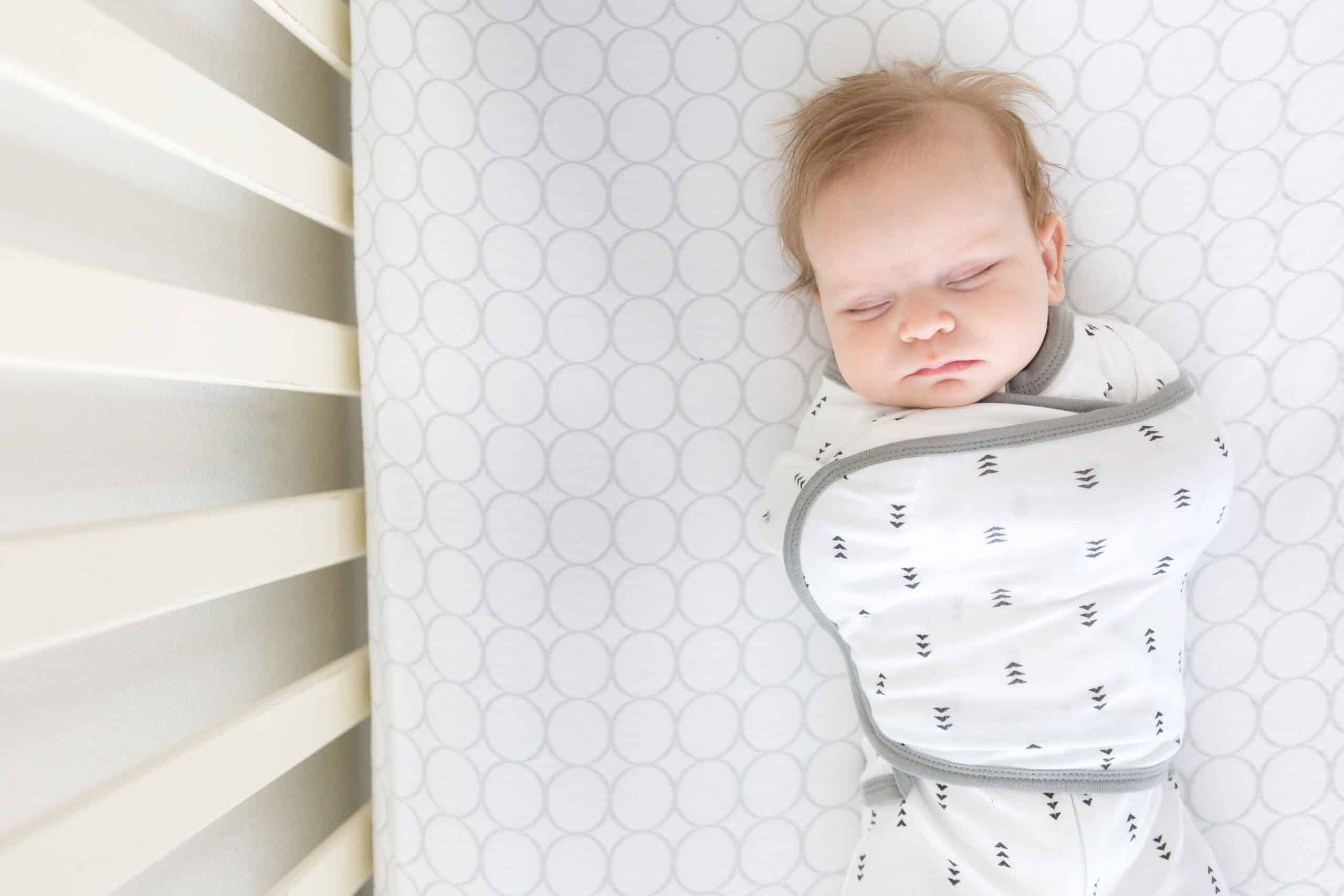When your little one is born, all they want is to be close to you all the time. After spending nine months hearing your voice and your heartbeat constantly, it’s no surprise that they feel safest when you’re near. However, as they get older, they become more independent, and one important milestone is sleeping on their own. Most experts agree the safest place for your newborn is in your room in their own crib, but when is it time to let your baby sleep in their own room?
Moving your baby to their own room is a big step and it’s not something you should rush. Additionally, there isn’t one right answer for when your baby will be ready. There are many factors to consider but it’s considered safest to keep your baby in your room until they’re at least six months old.
Keep reading to find out when a baby should sleep in their own room and how to know when they’re ready to sleep on their own.

When a baby is born, it's normal for them to want to be near you, even at night.
©Christin Lola/Shutterstock.com
When Should a Baby Sleep in Their Own Room?
Whether your baby is a great sleeper or is struggling to stay asleep at night, one of the most common questions parents have about sleeping arrangements is when should a baby sleep in their own room. Like most decisions in parenting, there’s not one clear answer. All parents and children are different and what’s right for your child isn’t necessarily what’s right for another family.
From the time your baby is born, it's often safest to have your baby close to you. Organizations such as the American Academy of Pediatrics consider it safest for your baby to sleep in a crib or bassinet in the room with you. This arrangement, also known as room sharing, is best for babies until they’re at least six months old, and ideally, until they’re one year old.
The main reason why room sharing is recommended is because it can reduce the risk of SUDI, or sudden unexpected death in infancy. When your baby is in the room with you, it allows you to easily check on them during the night and reach them quickly if they need you.
It’s also practical for your baby to sleep in the room with you, especially when they’re a newborn. Newborns tend to wake up to eat every few hours and walking to your baby’s room multiple times a night can add to your exhaustion.
Of course, even with your baby in the room, It’s still important to practice safe sleep habits, but having your little one near you can provide you with peace of mind. That being said, there will come a day when you’re ready for your baby to sleep in their own room and you might wonder when it’s okay to make this change.
How Long Should Baby Sleep in Your Room?
One of the best ways to keep your little one safe during the night is to provide them with a safe sleeping environment. Every family is different when it comes to deciding on sleeping arrangements, but to help guide parents in their decision, many experts have weighed in on what is safest when it comes to infant sleep.
The American Academy of Pediatrics recommends that your baby sleep in the same room with you at least until they’re six months old and ideally until they’re one year old. You can move your baby to their room sooner, but it may be beneficial to consider the reason for moving them and carefully weigh the risks vs benefits.
Since every family is different, there may be various factors contributing to your desire to move the baby to their own room. However, it’s important to determine whether your baby is ready for this change before you transition them to sleep by themselves.
Is Your Baby Ready to Sleep in Their Own Room?
Before deciding to switch up your baby's sleeping arrangement, make sure they have a safe space to sleep in their room. If they’ve been sleeping in a bassinet, their crib should be set up in their room and ready to go before you move them. They’ve likely outgrown their bassinet, especially if they’re at least six months old and are starting to roll over on their own.
One of the reasons why you might consider moving your baby is because they’re interrupting your sleep or you feel they’ll sleep better in their room. Sleep deprivation is common for new parents but in the long run, you have to find an arrangement that works for you and your baby. Everyone in the family needs to get enough sleep since sleep deprivation can impact your well-being.
You also might ask yourself if you’re ready for your baby to move to their room. This is ultimately a tough decision and it’s okay if you don’t feel ready quite yet. Remember that there’s no rush to reach this milestone and it’s okay to keep your baby in your room a little bit longer if you’re not ready.
Signs Your Baby Is Ready to Sleep in Their Room
Every child is different when it comes to sleep, but here are some possible signs your baby might be ready to move to their room:
- Your baby is at least six months old
The American Academy of Pediatrics recommends that your baby sleep in your room until they’re at least six months old. This is safest for your baby and can reduce the risk of SIDS. - Your baby is struggling to sleep at night
It’s normal for babies to wake up frequently, especially when they’re little. If your newborn is waking every few hours, that’s not a reason to move them to their own room. However, if you have an older baby or toddler who is still frequently waking up, you might try moving them to their own room and see if they sleep more soundly. - There’s a new baby on the way
If you’re expecting a new little one, it may be time to consider a different sleeping arrangement. Room sharing with two children can be a challenge, so you can start transitioning your older child to their own room before the new baby comes.
If your baby has already passed their first birthday, the American Academy of Pediatrics doesn’t have guidelines on room sharing past one year. Whether your baby is starting to sleep for longer stretches or they’re struggling to sleep through the night, moving them to their own room might be the right choice for your family.
Will Moving Your Baby to Their Own Room Help Them Sleep Better?
While there are numerous reasons why parents consider changing up their baby’s sleeping arrangements, many transition their babies to sleeping on their own in the hope that it will help them sleep better. Before you make this change, you’re probably wondering whether your baby will sleep better in their room.
Every child is different and baby sleep often has more to do with your baby’s temperament than anything else. In some cases, your baby might sleep better in their own room. As they start to become more aware of their surroundings, they sometimes wake up more frequently because they know you’re near.
However, remember that it’s normal for babies of a certain age to wake up frequently during the night. Sometimes they wake up because they’re hungry and other times because they’re seeking comfort. Both of these reasons are normal. Just because your child is waking through the night doesn't necessarily mean that something is wrong.
Also, if you have a strong-willed child who frequently wakes up to be held or fed, moving them to their own room may not necessarily solve your problem. If they’re struggling to sleep all of a sudden, they also could be going through a sleep regression or teething.
Consider whether there’s another arrangement that can help you and your baby be at peace during the night if you’re worried about how this change will impact your baby. If you’re able to get enough sleep, there’s nothing wrong with letting your baby stay in your room until you feel comfortable moving them.

Transitioning your baby to sleeping in their own room takes patience and consistency.
©javi_indy/Shutterstock.com
Tips for Helping Baby Adjust to Sleeping in Their Own Room
If you’ve decided you and your baby are both ready to make this transition, where do you start? Like any big change in your baby’s life, it’s important to start slow and understand that it will take time for both you and your baby to adjust.
Here are some tips for helping your baby transition to sleeping in their own room:
- Start with nap time
Instead of having them spend the night in their room right away, try to have them nap there first. These short bursts of time sleeping in their room can help your baby get used to sleeping there and become more comfortable before spending the night away from you. - Keep a consistent routine
Don’t underestimate how much children thrive on routines. Having a consistent bedtime routine is crucial to helping your child adjust. If part of the routine is rocking them to sleep and singing to them, try starting the routine in their room a few nights before they sleep alone for the first time. - Be consistent
It’s okay if they don’t make it through the whole night during the transition period. You can try to start the night in their room and when they wake in the middle of the night, have them then move to the bassinet in your room. No matter how you do it, be consistent and start the night in their room each time.
If you decide to move your baby to their room, remember it will take time for your little one to transition. It’s not easy but try to be patient as they adapt to their new sleeping arrangement!
Making the Transition to Baby’s Room: Final Thoughts
While the American Academy of Pediatrics recommends you let your baby sleep in your room until they’re 6-12 months old, not every baby will be ready to transition at that point. If you and your baby are ready for this change, take it slow and be consistent. However, it’s okay if you’re not ready as well. Pay attention to your baby’s cues and follow your gut when it comes to what your baby needs. You know your baby better than anyone!
The image featured at the top of this post is ©SwaddleDesigns/Shutterstock.com
